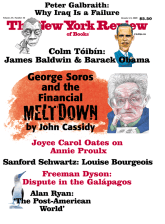In response to:
The Devastation of Iraq's Past from the August 14, 2008 issue
To the Editors:
As someone who has been paying very close attention to the fate of archaeological sites, museums, libraries, and the people of Iraq for the past few decades, it is good to see Hugh Eakin’s “The Devastation of Iraq’s Past” [NYR, August 14].
While it is true that the first book listed (Catastrophe! The Looting and Destruction of Iraq’s Past, edited by Geoff Emberling and Katharyn Hanson) is available at the attractive price cited, readers may also be interested to know that the book is available online free of charge at oi.uchicago.edu/ research/pubs/catalog/oimp/oimp28.html.
Indeed, the Oriental Institute has taken the bold and laudable decision to make all the published products of its research programs accessible without charge. A convenient list of the more than one hundred volumes of scholarship currently accessible can be found at oihistory.blogspot.com/2008/04/oriental-institute-electronic.html. Much of it documents the intellectual and material remains of the people who inhabited Iraq in the past.
Those who may wish to follow the issues raised in Mr. Eakin’s essay are invited to join the Iraq Crisis mailing list, which I moderate: listhost.uchicago.edu/mailman/listinfo/iraqcrisis.
Charles Ellwood Jones
Head, ISAW Library
Institute for the Study of the
Ancient World
New York University
New York City
Hugh Eakin replies:
I am grateful to Charles Jones for calling attention to online resources related to the archaeology and cultural heritage of Iraq and Mesopotamia.
Readers may be interested to know that, since the publication of my article, a vigorous debate has appeared on Mr. Jones’s Iraq Crisis mailing list concerning recent statements by one Iraqi government official that most looting has subsided. Indeed, as I wrote in the article, various indications, including both reports on the ground and the available satellite evidence, show that the worst of the looting took place in a particular region of the south during the first two years of the conflict.
Among those who have followed the situation closely, however, there is considerable disagreement over when the organized attacks stopped, and about the present condition of the affected sites. The official who made the recent statements did not present specific information to back up his claims, and until the situation in Iraq stabilizes further it may not be possible to draw definitive conclusions.
That debate, of course, is secondary to the alarming fact of the looting itself, which is well documented by eyewitness accounts, photographs, seizures of thousands of objects, and a forthcoming documentary by Micah Garen, who saw it happen.



